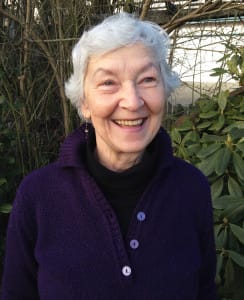[This story originally appeared in the Spring 2014 issue of The Cultivator, The Cornucopia Institute’s quarterly print publication available to members and online.]
Many of us have had an aha! moment or moments that sparked our decision to farm, garden or eat organically. In this issue, veteran Cornucopia board member Goldie Caughlan tells how she heard the call and came to devote herself to environmentalism and nutrition education.
by Goldie Caughlan, Board Member, The Cornucopia Institute
 As with many highly scheduled urban families, our life was pretty frenetic when the kids were young.My husband and I worked full time, he as a lawyer, I as a paralegal. We also tended to the frequent health issues of our aging mothers and—not busy enough, I guess!—in 1973 I began classes at the University of Washington.
As with many highly scheduled urban families, our life was pretty frenetic when the kids were young.My husband and I worked full time, he as a lawyer, I as a paralegal. We also tended to the frequent health issues of our aging mothers and—not busy enough, I guess!—in 1973 I began classes at the University of Washington.
Rushed and stressed, we had fallen into the habit of going out for fast food two or three times a week. Happy Meals at McDonald’s and greasy, finger-lickin’ Kentucky Fried Chicken were big hits with the kids. It all tasted pretty much the same, but it was so easy, we rationalized. Besides, it really was cheap…or so it seemed.
My wake-up call? It came on the first day of the only class I’d signed up for that fall quarter: Introduction to Physical Anthropology. There I sat, in an auditorium with more than 600 students, as an elderly professor mounted the podium. “Surprise!” he boomed. This section was NOT going to be physical anthropology, he explained, but rather “an experiment” during his last year of teaching. We would be studying numerous aspects of changes in land use, global agricultural and processed food systems, and especially how farming practices, food, nutrition and health had been impacted since 1900.
Stunned silence followed—then a near stampede as over 500 students accepted his invitation to escape!
Me? I was hooked—and remained so for that quarter and the two more that were added for the 40 or so of us who remained thoroughly engaged.
Thus began the reawakening within this family-farm child from rural Idaho of the late 1940s. As flashes of memories returned, I became increasingly shocked and incensed with each new revelation of the losses of land, of family farmers, and of whole communities that had long supported, and been supported by, those farm families. As a class we also discussed the presence of ever more toxic poisons in our food and water that accompanied corporatized consolidation of agriculture.
But the most compelling moment, the inspiration, the “life direction changer” came for me in a thin little book I read the first week of the first quarter of this remarkable journey. The loudest call to action I heard came from Frances Moore Lappe’s Diet for a Small Planet (see www.foodfirst.org). She lit the flame of passion for right livelihood in agriculture, food and nutrition by exposing the invalidity of feeding grains, particularly corn and soy, to animals and argued in favor of eating less (or no) animal products raised on such methods, which would free up more protein for the world.
That one concept stunned and intrigued me, and sent me scurrying within the first week to find, and join, the then-tiny Puget Consumers Co-op. (Now PCC Natural Markets, today the 60-year-old co-op has more than 50,000 members, 1,200 staff, and a tenth store opening this spring.)
In those first weeks I asked so many questions of their very small staff and volunteers, that within a month they talked me into joining their board of trustees, where I served three two-year terms. The co-op, too, opened me and my family to the joys of discovering all that was right and timely, community-building, empowering and delicious in the world of cooperatives and farming systems. And we never revisited the likes of McDonald’s again! In fact, for the next 20 years we were mostly vegetarian, with an occasional roast beast during winter holidays—and plenty of fresh salmon and clams. After all, we live in Puget Sound!
In 1983, I joined the PCC staff as Health Educator. A month later I founded the co-op’s cooking school and added food training sessions for all staff, and free introductory lectures weekly for all members and non-members, firmly believing that Americans needed to cease relying on over-processed foods and relearn how to shop and prepare whole foods. From the start, all cooking classes and training sessions stressed discovering the taste, beauty, nutritional advantages and flavors of whole foods, produced with chemical-free farming and production methods.
The term “organic,” as we use it today, simply meant “whole” or “natural” in the ’70s and early ’80s. How ironic that the term “natural” has now, through misuse, all but lost its meaning. We must NOT let the same thing happen to “organic.”
GOLDIE CAUGHLAN was a Nutrition Educator for over 30 years for PCC Natural Markets in Seattle, the largest cooperative grocer in the U.S. She served on the USDA National Organic Standards Board from 2001 to 2006.

